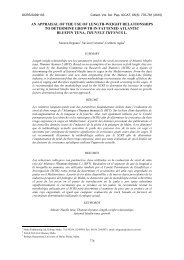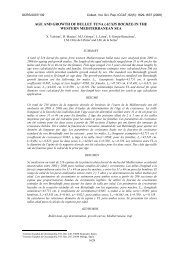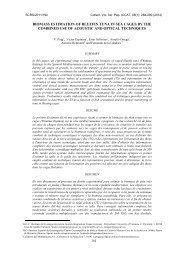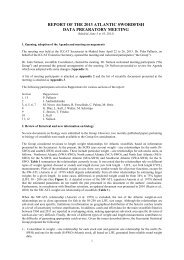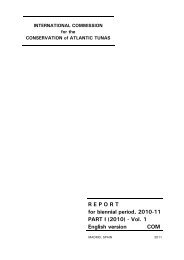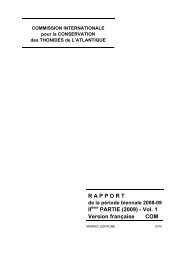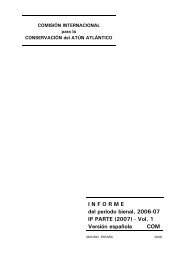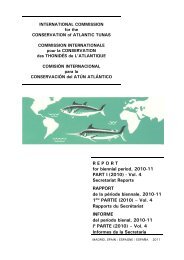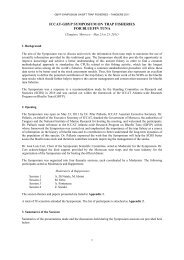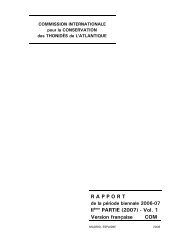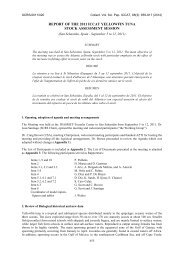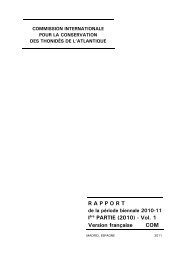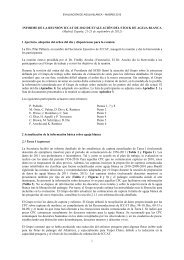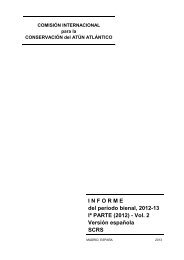E - Iccat
E - Iccat
E - Iccat
Create successful ePaper yourself
Turn your PDF publications into a flip-book with our unique Google optimized e-Paper software.
ICCAT REPORT 2002-2003 (II)<br />
several problems that are a direct consequence of poor data coverage. For example, for some species, a<br />
significant part of the size data (Task II) needs to be constructed (“substituted”) based on assumptions; if the<br />
coverage of observations was improved, there would not be a need to make so many substitutions.<br />
Finally, the Secretariat’s paper showed that many countries submit their data after the deadlines. Also it often<br />
happens that major historical data revisions are submitted during the stock assessment sessions, long after the<br />
deadlines. This practice is disruptive to the conduct of the meetings where many analyses are conducted<br />
sequentially; a late data revision can be a cause for mistakes that propagate through the analyses in the meeting.<br />
The Chairman noted that, as mentioned in the Secretariat’s paper, many countries appear not to have the data<br />
collection programs that are necessary for providing detailed statistics to ICCAT. Lack of capacity could range<br />
from lack of data collection infrastructure to lack of resources for sending scientists to meetings. Dr. Pereira<br />
recommended that ICCAT should investigate ways of finding resources for capacity-building.<br />
5.2 Review of responsibilities for providing data<br />
The Secretariat informed the Workshop that there are a number of ICCAT instruments that call on Contracting<br />
Parties, and Cooperating non-Contracting Parties, Entities or Fishing Entities to submit fisheries data. These<br />
obligations are clearly stated in Article IX (paragraph 2) of the ICCAT Convention, Rule 13 (paragraph 2) of the<br />
Rules of Procedure, the Resolution on the Collection of Statistics on the Atlantic Tuna Fisheries [Ref. 66-01],<br />
and the Resolution by ICCAT on the Deadlines and Procedures for Data Submission [Ref. 01-16], as well as<br />
under the United Nations Agreement on Straddling Fish Stocks and Highly Migratory Fish Stocks, and the FAO<br />
Code of Conduct for Responsible Fishing, as detailed in the Secretariat’s annual “Request for Atlantic Tuna and<br />
Shark Statistics”.<br />
The Secretariat noted that early in each calendar year, the Executive Secretary sends out a “Request for Atlantic<br />
Tuna and Shark Statistics” to all Contracting Parties, and non-Contracting Parties, Entities or Fishing Entities<br />
operating tuna and/or shark fisheries in the Atlantic Ocean and Adjacent Seas. This includes a request for Task I<br />
(catch and fishing power (fleet) statistics), Task II (catch and effort statistics and size data), and catch-at-size<br />
data. These requirements are readily available on the ICCAT web site (www.iccat.es).<br />
5.3 Species-by-species considerations relating to the credibility/reliability of catch data<br />
The data deficiencies were discussed species -by-species, and presented by the respective SCRS Rapporteurs. It<br />
was noted that for every assessment, the Species Groups write a Detailed Report that explains what data and<br />
analyses were used, provides results, and lists a series of recommendations. Rapporteurs summarized some of<br />
these recommendations in relation to catch data (presented in SCRS/2003/021 and summarized in Appendix 4<br />
To ANNEX 4.3). The term “fishing parties” is used to refer to Contracting Parties and non-Contracting Parties,<br />
Entities or Fishing Entities that catch a given species.<br />
5.3.1 Bluefin tuna<br />
Dr. J. M. Fromentin, Rapporteur for the East Atlantic Bluefin Species Group, stated that the data problems for<br />
this species are so serious that a reliable assessment could not be conducted in 2000 or 2002. This is due to a<br />
deterioration of data as a result of both the deterioration of catch data leading up to (over-reporting prior to 1996<br />
in order to have catch history), and following (under-reporting after 1997 to meet compliance targets) the<br />
imposition of quotas, and the development of bluefin farming (especially since 2000). He noted that considerable<br />
catches in the Mediterranean go to cages, making it essential for the SCRS to have information about the origin<br />
of the catch, the magnitude of the catch, and the amount and the size distribution from farming. Dr. Fromentin<br />
emphasized that there is a need for observers on-board the cages, as well as good estimates of bluefin growth<br />
while in the cages. The fact is that the tools for stock assessment simply cannot be used, as the available data are<br />
insufficient. Dr. Fromentin noted that some solutions to these problems could be found in the SCRS proposal for<br />
an enhanced Bluefin Tuna Research Program being proposed to the Commission this year.<br />
The Delegate of the EC made a general comment agreeing that the quality of the bluefin data must be improved.<br />
He further noted that unless there is a commitment by all Contracting Parties, improvements in data quality as a<br />
result of this meeting would be limited. All Contracting Parties need to take note of the recommendations,<br />
including the improvement of the eastern bluefin data. The EC recognized that some fishing parties might need<br />
the help of the Commission to make improvements.<br />
118



